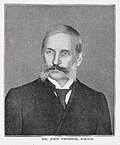English: John Thomson: THE Praya (for so the Portuguese term the broad stone-faced road along the harbour in front of the city) affords a pleasant drive some miles in extent, and joins the route to Show-ke-wan in the Ly-ee-moon Pass through which we approach the port from the East. This view is taken from the front of the Parade ground, and represents the principal business part of the Praya. The block of buildings facing the water on the left are the premises of the Hong-Kong and Shanghai and Chartered Mercantile Banks. The huge edifice in the centre was erected by Messrs. Dent. The merchants commonly have their offices on the ground -floor, and reside in the chambers above ; there they command an extensive view of the harbour as they promenade in spacious verandahs " when the wind bloweth in from the sea."
The architecture is massive and strong, yet the designer has managed to impart an appearance of lightness to his work, insufficient, one would fancy, to resist the typhoons which sometimes blow with incredible violence. I remember during a typhoon, when the storm was at its height, a number of foreigners attempted to rescue two women from a small China boat. Their tiny vessel was as nearly as possible in the position now occupied by the yacht in the centre of the picture, and was kept there by the desperate efforts of the boatwomen, who strove to prevent it from being dashed against the Praya wall, which, having been entirely broken by the force of the sea, presented a front of jagged blocks of granite, interspersed with the wreck of boats that had been shattered to pieces on the stones. The strength of the wind was so great as to reduce the wild raging sea nearly to a level, catching up in its fury the tops of the waves, and hurling them in blinding spray into, and over the houses. We had to cling to the lamp-posts and iron-boat stanchions, and seek shelter against the walls and doorways. Advantage was taken of a lull in the storm to fire off rockets, but these were driven back like feathers against the houses. Two long-boats were dragged to the stone pier. The first was broken and disabled the moment it touched the water; the second met with a like fate, its gallant crew being thrown into the raging sea. Every effort proved abortive, and as darkness set in the boat and the unhappy women were abandoned to their fate. Next morning the whole length of the Praya presented a scene of wreck and devastation. Many of the natives had lost their lives ; and many more, all that they possessed in the world, by the destruction of their boats ; for these not only form their floating dwellings, but afford the means of gaining a subsistence. Much of the distress was at once relieved by the prompt liberality of the foreign and native community. This ready open-handed liberality is a characteristic of the foreign communities of Hong-Kong and the other ports of China. A kind of Christian charity is rife among them, requiring no efforts of pulpit oratory, no eloquent private appeals, no public dinners to wake it into action. A simple notification that there is a widow or an orphan to be aided, and the sympathy and funds are forthcoming to provide for them. I must not omit to mention the flagstaff shown on the Peak above the city ; one of the early institutions of the Colony, and to winch a resident signalman and code of signals are attached. It is an object of solicitous attention among the European community, for it proclaims the approach of every foreign vessel as she enters the Port.
Few who have made Hong-Kong for any time their home, have not watched with earnestness the bare post and spars of the signal staff, and experienced a sense of relief, or a quickened pulsation, as they noticed the little flag unfurled, and the flash from the Peak gun, that heralded the arrival of the mail in the harbour.



